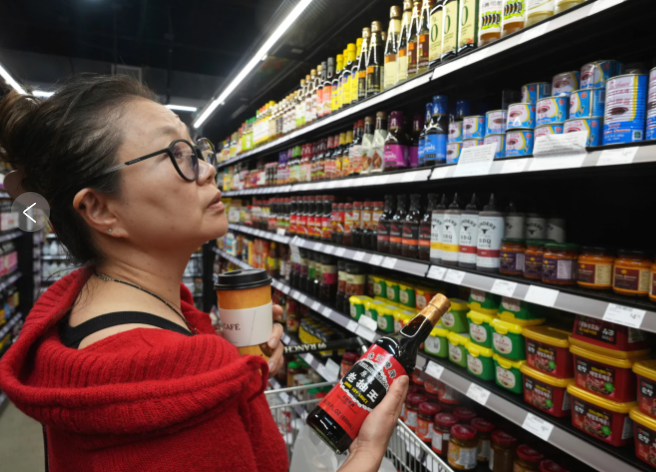Loyal customers of Asian supermarkets and specialty grocery stores have expressed concern over the impact of President Donald Trump’s new tariffs on goods imported from numerous countries. Many Asian Americans and immigrants who rely on stores like 99 Ranch Market and H Mart for products such as Kewpie mayonnaise from Japan and Pearl River soy sauce from China are now wondering what will happen to prices at these markets.
With the tariffs set to take effect, social media users shared their worries, with one TikTok user remarking, “We’re all going to be crying in H Mart,” and others posting videos of their “pre-tariff hauls” from Asian supermarkets. Trump’s latest tariffs, which include steep rates on goods from countries like South Korea (25%), Vietnam (47%), and Cambodia (49%), are adding to the uncertainty. Additionally, tariffs on Chinese goods have risen to a staggering 104%.
Despite the looming price hikes, some loyal customers like Artis Chitchamnueng, who shops at 99 Ranch Market, say they’ll keep going to their favorite grocery store if prices rise, even though they may have to adjust their shopping habits. While mainstream stores may carry some of the same products, Asian supermarkets often offer better prices on imported goods. For example, an 18-ounce bottle of Lee Kum Kee Panda oyster sauce costs $3.99 at 99 Ranch, compared to higher prices at Safeway and Walmart.
Tony He, an international student at UCLA, echoed similar sentiments, saying he would continue shopping at 99 Ranch for Asian food regardless of the potential price hikes. The rise in demand for international groceries, especially Asian foods, has been steadily increasing. In 2022, international grocery stores generated $55.8 billion in revenue, with forecasts predicting it will surpass $64 billion by 2029.
As the U.S. immigrant population grows, demand for culturally specific products has also risen, making these markets essential for many families and individuals. However, some experts believe that the tariffs may cause customers to look for alternative brands or switch to different food types altogether, as evidenced by a professor recalling how her parents adapted to new rice varieties when they arrived in America in the 1980s.
Independent stores, particularly those serving smaller Asian American communities, are also bracing for impact. The owner of Not Just Spices, a small South Asian grocery store in Rhode Island, expressed concerns about price increases for staple products like basmati rice. Similarly, Hispanic supermarkets are worried about potential price hikes due to Trump’s threats of tariffs on Mexican goods.
For shoppers, experts suggest it may be wise to stock up on non-perishable items, but caution against panic buying, which could exacerbate shortages and raise prices further. Though the exact impact on consumer prices remains unclear, any increases are expected to disproportionately affect low-income households, which tend to spend a larger portion of their income on food.
Despite these challenges, some experts believe the tariffs might ultimately bring people back to ethnic enclaves like Chinatowns and Little Italys, where these culturally specific markets have long played a crucial role in serving immigrant communities.













